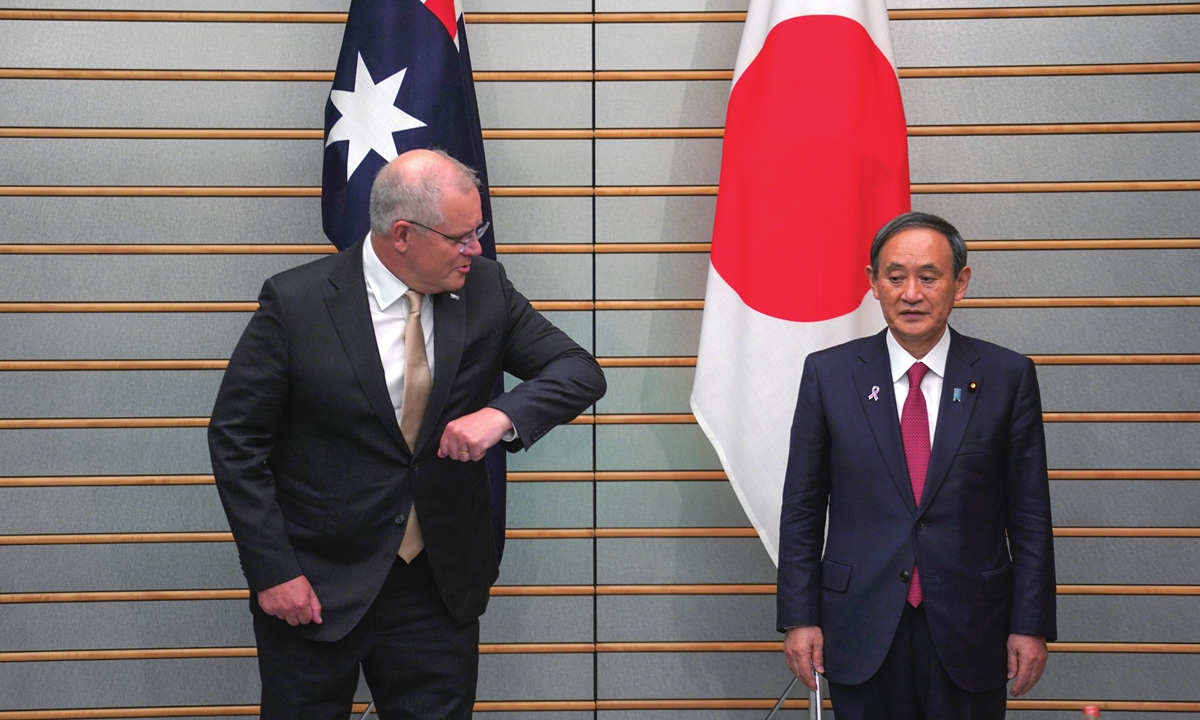Japan, Australia continue to pursue containment of China despite RCEP
By Da Zhigang Source: Global Times Published: 2020/11/18 21:26:47

Australian Prime Minister Scott Morrison (left) poses with Japanese Prime Minister Yoshihide Suga at the start of their meeting at Suga's official residence in Tokyo, Japan on Tuesday. Photo: AFP
Australian Prime Minister Scott Morrison kicked off his visit to Japan on Tuesday. Although Morrison and Japanese Prime Minister Yoshihide Suga did not sign as the world predicted, but agreed in principle on the Reciprocal Access Agreement (RAA).Japan and Australia have recently been moving closer. When taking office in September, Suga picked Morrison for his first call, instead of the US president. In return, Morrison chose Japan as the destination of his first overseas trip since the COVID-19 pandemic. Both countries clearly aim at China by strengthening bilateral ties. That they agreed in principle on the RAA signals Japan-Australia relations have entered a new stage.
Japan signed the Treaty of Mutual Cooperation and Security with the US. Its plan to sign another agreement on defense with Australia shows its clear awareness of the significance of Australia in the Indo-Pacific Strategy. Japan believes Australia can play a big role in containing China in the East and South China seas and even the whole Pacific.
The geopolitical location of Australia is important. Australia is a common wealth country and an important partner of the US. It shares the same ideology with Western countries and has common values with Japan. In addition, Australia enjoys a certain reputation among Pacific island countries.
From the statements of Japan and Australia, it is highly likely that the two countries will sign the RAA. The two will also become military allies.
The quasi-alliance between Japan and Australia will bring some changes. For one, it lays ground for the US and Japan to engage in multilateral cooperation in the Asia-Pacific. Japan and Australia may conduct defense cooperation under multilateral frameworks.
Japan and Australia each have an influence over certain countries. A quasi-military alliance between Japan and Australia will boost cooperation on security matters among their partners. Ostensibly, the military alliance between Japan and Australia is bilateral, just like how the US-Japan military alliance looks. However, such a bilateral relationship can have the potential role of demonstration and proliferation due to the wide range of influence of the two countries. It could bring uncertainty to the region and thus increase geopolitical security tensions.
Facing the upgrade in Japan-Australia relations with China as its main target, China should continue promoting multilateral mechanisms, maintain regional stability and safeguard its territorial security. If Japan and Australia upgrade their relations to a quasi-alliance, it will make it harder for China to do so. In that case, China should enhance its ability of counterattacking and stay alert for the possible threat that the Japan-Australia quasi-alliance might bring. It also needs to promote diplomacy and amplify China's voice through media and other international public opinion. Regional economic and trade cooperation should also continue to be promoted to make it become a mainstream trend and reduce confrontation in the region.
Japan and Australia are the closest allies of the US. The escalation of Japan-Australia ties can be viewed, to some extent, as a supplement of US-Japan relations. In wartime status, the three countries may soon forge a trilateral synergetic alliance. The boost in Japan-Australia ties will also improve Japan's military capability. Unlike Japan, the US and Australia are not bound by a peace constitution. With more military cooperation with other partners, Japan could realize some military goal it could hardly reach before through the help from the other sides.
Some observers tend to ask what Tokyo and Canberra's calculations are, since they have just signed the Regional Comprehensive Economic Partnership. Many countries have separated politics from economic issues. Economic collaboration does not affect geopolitical containment. Japan and Australia are typical in such a mindset. On the one hand, they want to do business with China. On the other, they show no sign of stopping their China containment strategy geopolitically.
According to Japanese media outlet Nikkei Asian Review, Biden during phone conversations with Morrison and Suga talked about maintaining a "secure and prosperous Indo-Pacific," avoiding the "free and open" phrase. The subtle rhetorical differences with the Trump administration have aroused worries over whether the Biden administration would shift position in the Indo-Pacific region. It's imperative for Morrison and Suga to show their stance to the US that "should the US ratchet down its involvement in the QUAD, the grouping would lose much of its power as a deterrent against Beijing."
I don't agree with such a view. Biden's option for using a "secure and prosperous Indo-Pacific" indicates that if he takes office, he won't give up the Indo-Pacific Strategy, but he will make it different from Trump's. Biden's Indo-Pacific Strategy may emphasize more on security and prosperity, and be more exclusive to China.
The Biden administration will continue to advance the QUAD, but make some adjustments to better reflect Biden's philosophy. Both direction and wording will be recalibrated.
The author is director and research fellow of Institute of Northeast Asian Studies at Heilongjiang Provincial Academy of Social Sciences and chief expert at Northeast Asian Strategic Studies Institute. opinion@globaltimes.com.cn
Posted in: VIEWPOINT,ASIAN REVIEW